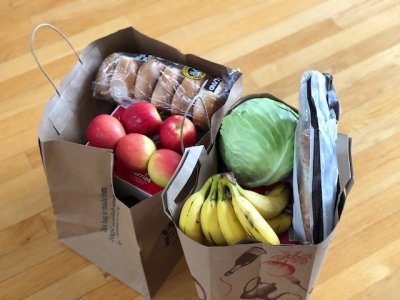Want to reduce food waste and save money? Check out these five grocery shopping tips!
By
Seia Ibanez
- Replies 16
With the cost of living higher than ever, saving money is a top priority for Aussie households. But it’s not just supermarket prices that you need to worry about—it’s food waste.
It's heartbreaking to think of all of that food going to waste, so when it comes to saving precious food items, it’s crucial to remember that your supermarket habits matter.
Food waste is an issue across Australia, with the average household throwing away $3,800 worth of food per year, or almost $73 each week.
To ensure you’re getting the most bang for your buck and reducing as much food waste as possible, use these five simple tips when shopping for groceries to reduce the amount of food that you throw away each week and save money!
1. Grab products at the back of the shelf
When it comes to that cool section of the store where they keep refrigerated items, reach for the back of the shelves.
The expiration dates of products on the back are longer than those on the front. The temperature at the back is much cooler as well, which means they’ll last longer.
Use this tip for all products in the cool section, particularly milk, soft cheeses, and yoghurt.
2. Avoid fruits and vegetables on top of the display
We’ve all had that experience where we pick up fruits and vegetables for a thorough inspection. But what we often don’t consider is how many hands have handled that piece of fruit or vegetable before we place it in our carts.
To make sure you’re picking up fresh produce, avoid items located at the front and top of the display, as these are likely to have had more contact with human hands. The more frequently the produce is handled, the quicker it’ll start to break down.
3. Portion out and freeze your meat
Sometimes, when we buy meat from a deli counter, a butcher, or the pre-packaged section at our local supermarket, we forget about our purchase and put the meat in a freezer in one lot, defrosted it, only to find that we don’t need to use them all, and end up throwing the rest away.
As such, it is important to portion the meat immediately when you get home after buying it.
Once you portion the meat, you can put what you need in the fridge while freezing the rest of the meat. That will keep them fresher for longer.
4. Pre-prepare your fruit and vegetables
The previous tip works just as well with fruit and vegetables.
When you get home, grab some of your older fruits and vegetables and use them in recipes for the same day, or even freeze them for that next baking venture you’ve got coming up.
Older vegetables can be chopped up and frozen for rice dishes and soups.
Newer vegetables and fruit can also be cut, peeled, and washed so that they will be ready for easy use when you need them.
You may also need to know the difference between ‘best before’ and ‘use-by’ dates for fruits and vegetables. According to Commonwealth Scientific and Industrial Research Organisation's (CSIRO) Consumer Food Safety Spokesperson, Dr Rozita Vaskoska, 'The use-by dates are very firm. The product shouldn't be used (past that date).'
When it comes to ‘best before’ dates, Vaskoska said that ‘they reflect the quality will drop after that date, it doesn’t mean it will be unsafe to use’.
5. Meal planning is the way to go
Meal planning is ideal for those who want to use all the food in their fridge and reduce waste.
To start, take an inventory of what you have in your fridge and counter, and plan meals based on your available products.
This may take you a few minutes, but it does make a significant difference in reducing food waste.

Members, please note that the tips mentioned above are general advice and should not be considered expert financial advice. This article is for informational purposes only and may not be suitable for individual circumstances.
What do you think of these tips? Do you have other ways to save more when grocery shopping? Share them with us in the comments below!
It's heartbreaking to think of all of that food going to waste, so when it comes to saving precious food items, it’s crucial to remember that your supermarket habits matter.
Food waste is an issue across Australia, with the average household throwing away $3,800 worth of food per year, or almost $73 each week.
To ensure you’re getting the most bang for your buck and reducing as much food waste as possible, use these five simple tips when shopping for groceries to reduce the amount of food that you throw away each week and save money!
1. Grab products at the back of the shelf
When it comes to that cool section of the store where they keep refrigerated items, reach for the back of the shelves.
The expiration dates of products on the back are longer than those on the front. The temperature at the back is much cooler as well, which means they’ll last longer.
Use this tip for all products in the cool section, particularly milk, soft cheeses, and yoghurt.
2. Avoid fruits and vegetables on top of the display
We’ve all had that experience where we pick up fruits and vegetables for a thorough inspection. But what we often don’t consider is how many hands have handled that piece of fruit or vegetable before we place it in our carts.
To make sure you’re picking up fresh produce, avoid items located at the front and top of the display, as these are likely to have had more contact with human hands. The more frequently the produce is handled, the quicker it’ll start to break down.
3. Portion out and freeze your meat
Sometimes, when we buy meat from a deli counter, a butcher, or the pre-packaged section at our local supermarket, we forget about our purchase and put the meat in a freezer in one lot, defrosted it, only to find that we don’t need to use them all, and end up throwing the rest away.
As such, it is important to portion the meat immediately when you get home after buying it.
Once you portion the meat, you can put what you need in the fridge while freezing the rest of the meat. That will keep them fresher for longer.
4. Pre-prepare your fruit and vegetables
The previous tip works just as well with fruit and vegetables.
When you get home, grab some of your older fruits and vegetables and use them in recipes for the same day, or even freeze them for that next baking venture you’ve got coming up.
Older vegetables can be chopped up and frozen for rice dishes and soups.
Newer vegetables and fruit can also be cut, peeled, and washed so that they will be ready for easy use when you need them.
You may also need to know the difference between ‘best before’ and ‘use-by’ dates for fruits and vegetables. According to Commonwealth Scientific and Industrial Research Organisation's (CSIRO) Consumer Food Safety Spokesperson, Dr Rozita Vaskoska, 'The use-by dates are very firm. The product shouldn't be used (past that date).'
When it comes to ‘best before’ dates, Vaskoska said that ‘they reflect the quality will drop after that date, it doesn’t mean it will be unsafe to use’.
5. Meal planning is the way to go
Meal planning is ideal for those who want to use all the food in their fridge and reduce waste.
To start, take an inventory of what you have in your fridge and counter, and plan meals based on your available products.
This may take you a few minutes, but it does make a significant difference in reducing food waste.
Key Takeaways
- Food waste costs Australian consumers approximately $3,800 a year, equating to $73 a week that is discarded from expired products, uneaten fruit and vegetables, and dinner leftovers.
- Steps to reduce food waste begin at the supermarket with a careful selection of products and can be maintained at home through proper storage and preparation.
- Some tips include choosing products from the back of displays to ensure fresher items with longer expiry dates, being mindful when selecting fruit and vegetables to avoid produce that has been excessively handled, portioning out and freezing meat to prevent wastage, pre-preparing fruit and vegetables each week, and developing a meal plan.
Members, please note that the tips mentioned above are general advice and should not be considered expert financial advice. This article is for informational purposes only and may not be suitable for individual circumstances.
What do you think of these tips? Do you have other ways to save more when grocery shopping? Share them with us in the comments below!
Last edited:








